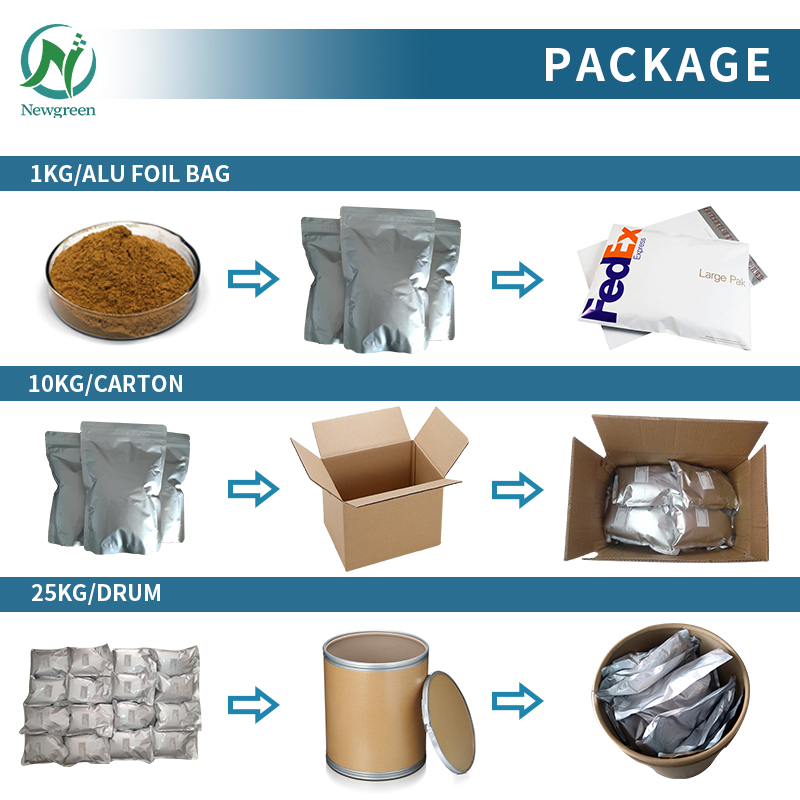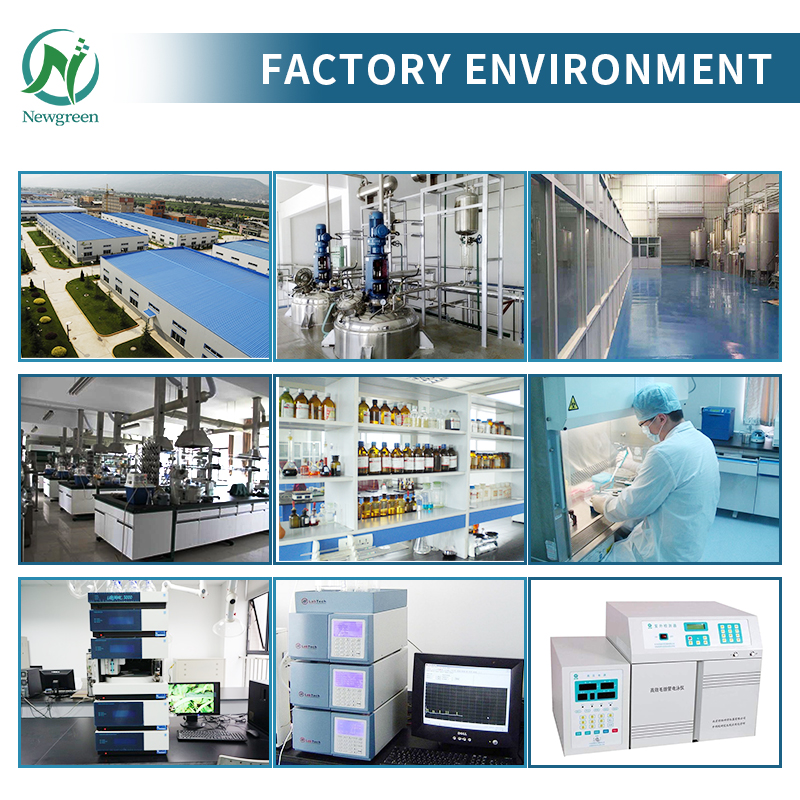Dihydroquercetin 99% Manufacturer Newgreen Dihydroquercetin 99% Powder Supplement

Product Description:
Taxifolin, also known as dihydroquercetin, is a flavonoid compound found in various plants, including onions, milk thistle, and Siberian larch trees. It is known for its antioxidant and anti-inflammatory properties, and it has been studied for its potential health benefits.
Taxifolin has been found to have a protective effect on the liver, helping to prevent damage caused by toxins and oxidative stress. It may also have anti-cancer properties, as it has been shown to inhibit the growth of cancer cells and induce cell death in certain types of cancer.
In addition, taxifolin has been studied for its potential cardiovascular benefits. It has been shown to have anti-inflammatory effects on blood vessels, which may help reduce the risk of heart disease. It also has the ability to improve blood flow and reduce blood clot formation.
Dihydroquercetin taxifolin, also known as quercetin flavin, soluble in glacial acetic acid, alkaline aqueous solution
Yellow, almost insoluble in water, bitter in ethanol solution. It can be used as medicine, has good expectorant and cough-relieving effects, and has a certain anti-asthmatic effect.
Taxifolin, also known as dihydroquercetin, is a flavonoid compound (belonging to vitamins) extracted from the biological essence of larch. It is one of the essential and important natural antioxidants and plant extract. Taxifolin is a precious drug and health food ingredient in the world.
Compared with the related compound quercetin, dihydroquercetin is not mutagenic and has low toxicity. It regulates genes through ARE-dependent mechanisms, acting as a potential chemopreventive agent.
COA:
| Product Name: Dihydroquercetin | Manufacture Date: 2024.05.15 | |||
| Batch No: NG20240515 | Main Ingredient:Dihydroquercetin
|
|||
| Batch Quantity: 2500kg | Expiration Date: 2026.05.14 | |||
| Items | Specifications | Results | ||
| Appearance | Yellow powder | Yellow powder | ||
| Assay |
|
Pass | ||
| Odor | None | None | ||
| Loose Density(g/ml) | ≥0.2 | 0.26 | ||
| Loss on Drying | ≤8.0% | 4.51% | ||
| Residue on Ignition | ≤2.0% | 0.32% | ||
| PH | 5.0-7.5 | 6.3 | ||
| Average molecular weight | <1000 | 890 | ||
| Heavy Metals(Pb) | ≤1PPM | Pass | ||
| As | ≤0.5PPM | Pass | ||
| Hg | ≤1PPM | Pass | ||
| Bacterial Count | ≤1000cfu/g | Pass | ||
| Colon Bacillus | ≤30MPN/100g | Pass | ||
| Yeast & Mold | ≤50cfu/g | Pass | ||
| Pathogenic Bacteria | Negative | Negative | ||
| Conclusion | Conform with specification | |||
| Shelf life | 2 years when properly stored | |||
Function:
1.Anti-oxidation: both dihydroquercetin and taxifolin have strong anti-oxidation effects, can inhibit the generation of free radicals and lipid peroxidation, protect cells from oxidative damage, thereby delaying aging and reducing diseases happened.
2. Anti-inflammatory: Dihydroquercetin and taxifolin have anti-inflammatory effects, can reduce inflammation, relieve pain, and promote tissue repair and regeneration.
3. Anti-tumor: Dihydroquercetin and taxifolin are commonly used anti-cancer drug ingredients, which can inhibit the growth and division of tumor cells through various mechanisms, while protecting normal cells and reducing adverse reactions of chemotherapy.
4. Protect cardiovascular and cerebrovascular: Dihydroquercetin and taxifolin can lower blood lipid and blood pressure, promote vasodilation, prevent vascular inflammation and hardening, and protect cardiovascular and cerebrovascular health.
5. Enhance immunity: Dihydroquercetin and taxifolin can regulate the function of the immune system, enhance the body's ability to resist pathogenic microorganisms and diseases, and improve immunity.
Application:
1.Taxifolin (Dihydroquercetin) applied in pharmaceutical field, it is mainly used as pharmaceutical materail.
2.Taxifolin (Dihydroquercetin) applied in the field of healthcare products, it was used in capsules, health food, health care products and other beverages.
3.Taxifolin (Dihydroquercetin) applied in Cosmetic field.
4.In the food industry, as a food additives, it can not only make food raw materials and food itself preservative, increase the shelf life, but also increase the preventive and therapeutic properties of food.
Package & Delivery



















